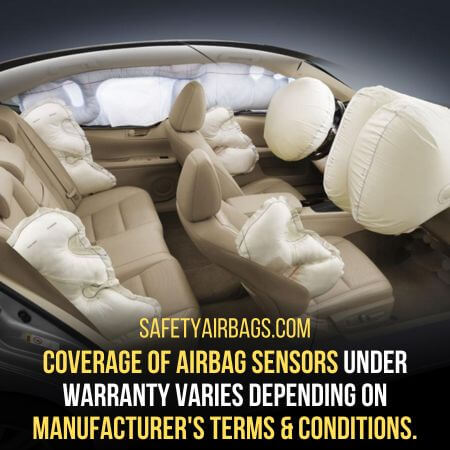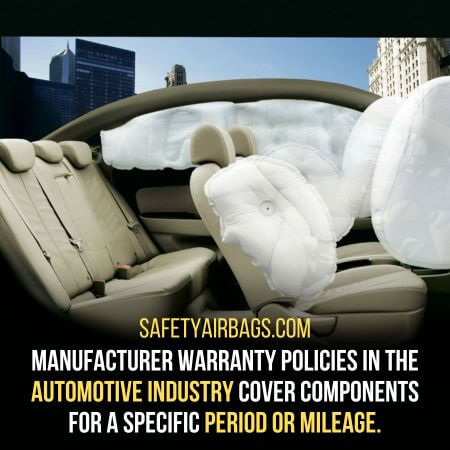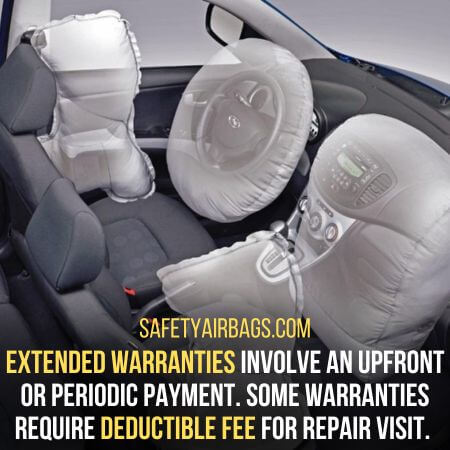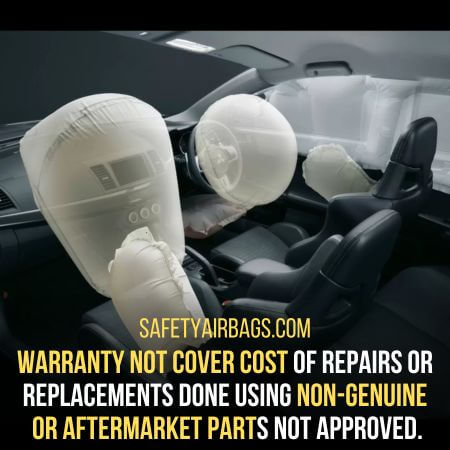Are Airbag Sensors Covered Under Warranty? The coverage of airbag sensors under warranty varies depending on the manufacturer’s or warranty provider’s specific terms and conditions.
What Will I learn
It is recommended to refer to the warranty documentation or consult with the manufacturer or dealer to determine the extent of warranty coverage for airbag sensors.
Are Airbag Sensors Covered Under Warranty?
Airbag sensor coverage under warranty can vary depending on the specific terms and conditions provided by the manufacturer or extended warranty provider.

It is important to refer to the warranty documentation or contact the manufacturer or dealer to determine the extent of warranty coverage for airbag sensors.
A warranty is a written guarantee provided by the manufacturer or seller of a product.
Its purpose is to assure customers that the product will perform as intended and to provide recourse in case of defects or malfunctions.
Different Types of Warranties:
There are various types of warranties available for consumers:
1. Manufacturer Warranty:
This is the warranty provided by the vehicle manufacturer and is often included with purchasing a new vehicle.
It typically covers a specific period or mileage.
2. Extended Warranty:
It is also known as a service contract or vehicle service agreement.
An extended warranty is an additional warranty that can be purchased to extend the coverage beyond the manufacturer’s warranty period.
3. Third-Party Warranty:
Some companies specialize in providing warranties separate from the manufacturer or dealership.
These third-party warranties may offer different terms and conditions.
Typical Warranty Coverage for Vehicle Components:
In general, a vehicle warranty covers defects and malfunctions that occur during the specified warranty period.
This coverage typically includes major vehicle components such as the engine, transmission, electrical system, and suspension.
Factors Affecting Warranty Coverage for Airbag Sensors
Several factors can influence warranty coverage for airbag sensors:
1. Manufacturer’s Policy:
Each manufacturer may have specific policies regarding warranty coverage for airbag sensors.
Reviewing the warranty documentation or contacting the manufacturer for precise details is important.
2. Maintenance and Misuse:
Warranty coverage may be affected if the airbag sensors fail due to improper maintenance.
It may also be affected by damage due to misuse or negligence.
3. Modifications and Aftermarket Parts:
Alterations or aftermarket parts installations may void the airbag sensors’ warranty coverage.
It is because they can interfere with their proper functioning.
4. Length of Warranty:
The duration of the warranty can impact coverage for airbag sensors.
Some warranties may cover these components for a specific period or mileage, while others may provide coverage for the entire warranty duration.
Manufacturer Warranty Policies
Manufacturer warranty policies in the automotive industry cover certain components and services for a specific period or mileage.
These warranties are designed to instill confidence in consumers regarding the quality and reliability of the vehicles they purchase.
Specifics of Warranty Coverage for Airbag Sensors:
When it comes to airbag sensors, manufacturer warranty coverage may vary.
Some manufacturers include airbag sensors as part of the general vehicle components covered under their warranty.

This can ensure repairs or replacements in case of defects or malfunctions.
However, it is essential to review the specific terms and conditions of the warranty to determine the extent of coverage for airbag sensors.
Limitations and Exclusions in Manufacturer Warranties:
Manufacturer warranties often come with certain limitations and exclusions.
These limitations may include wear and tear, normal maintenance items, and damage from accidents, misuse, or neglect.
It is important to read the warranty documentation carefully to understand these limitations and exclusions to avoid misunderstandings or unexpected expenses.
Length of Warranty Coverage for Airbag Sensors:
The length of warranty coverage for airbag sensors can vary depending on the manufacturer and the specific warranty offered.
Some manufacturers provide coverage for airbag sensors for the same duration as the general vehicle warranty.
In contrast, others may offer separate or extended coverage for safety-related components like airbag sensors.
It is crucial to check the warranty documentation or consult with the manufacturer or dealer to determine the exact length of coverage for airbag sensors.
Extended Warranty Options
An extended warranty is an additional warranty that can be purchased to extend the coverage beyond the manufacturer’s warranty period.
It is also known as a service contract or vehicle service agreement.
It provides benefits such as peace of mind, protection against unexpected repair costs, and potentially longer coverage for vehicle components.
Availability of Extended Warranties for Airbag Sensors:
Extended warranties typically cover various vehicle components, including airbag sensors.
However, the availability of extended warranties specifically for airbag sensors may vary.
To determine if airbag sensor coverage is included in an extended warranty plan, it is advisable to inquire with the manufacturer, dealer, or third-party warranty providers.
Coverage Details and Limitations in Extended Warranties:
Extended warranties for airbag sensors may differ regarding coverage details and limitations.
These warranties usually outline the specific components covered, the duration of coverage, and the conditions under which repairs or replacements are provided.
It is crucial to review the terms and conditions of the extended warranty carefully.
You must understand the extent of coverage and any applicable limitations or exclusions.
Costs Associated with Extended Warranties:
The cost of an extended warranty for airbag sensors can vary based on factors.
These include:
– Vehicle make and model
– The desired coverage length, and
– Warranty provider.
Extended warranties often involve an upfront or periodic payment, and some warranties may also require a deductible fee for each repair visit.

It is important to consider the costs associated with the extended warranty and assess whether the potential benefits outweigh the expenses.
Warranty Exclusions and Limitations
Warranty coverage often comes with certain exclusions and limitations.
While these can vary between manufacturers and warranty providers, there are some common exclusions and limitations to be aware of. These may include:
1. Normal Wear And Tear: Warranties typically do not cover damage or deterioration from regular usage over time.
2. Maintenance Items: Routine maintenance tasks like oil changes, tire rotations, and brake pad replacements are typically not covered by warranties.
3. Damage From Accidents Or Misuse: Warranties may not cover repairs or replacements for components that have been damaged due to accidents, improper use, or neglect.
4. Environmental Factors: Certain environmental factors, such as exposure to extreme temperatures or corrosive substances, may be excluded from warranty coverage.
5. Third-party Modifications: Alterations or installations of aftermarket parts that affect the vehicle’s performance may void the warranty coverage.
Factors That May Void Warranty Coverage for Airbag Sensors
Specifically for airbag sensors, some factors could potentially void warranty coverage. These factors may include:
1. Any repairs or modifications to the airbag system performed by unauthorized individuals or non-certified technicians can void the warranty.
2. Warranty coverage may be voided if the airbag sensors have been tampered with or damaged due to an accident.
3. Neglecting routine maintenance, such as not replacing airbag sensors according to the manufacturer’s recommended schedule, can void warranty coverage.
Repairs or Replacements Not Covered by Warranties:
While warranties provide coverage for certain components and repairs, there are instances where repairs or replacements may not be covered.
Some common examples include:
1. The warranty may not cover the cost of repairs or replacements done using non-genuine or aftermarket parts not approved by the manufacturer.
2. If the warranty period expires, any required repairs or replacements will typically not be covered.

3. Failing to adhere to the proper procedures for submitting warranty claims may result in the repairs or replacements not being covered.
4. Warranties may have mileage or usage limitations, and if the vehicle exceeds those limits, repairs or replacements may not be covered.
Steps to Take When Making a Warranty Claim for Airbag Sensors
When making a warranty claim for airbag sensors, it is important to follow these steps:
1. Familiarize yourself with the specific terms and conditions outlined in the warranty for airbag sensor coverage.
2. Collect all relevant information about the vehicle, including the VIN (Vehicle Identification Number), purchase date, and mileage.
3. Contact the manufacturer or dealer to initiate the warranty claim process and inquire about any specific requirements or forms.
4. Submit the required documentation, such as the warranty certificate, maintenance records, and any supporting evidence related to the airbag sensor issue.
5. If requested, arrange for an authorized service center or dealership to inspect the airbag sensors to determine the extent of the issue.
6. Once the warranty claim is approved, authorize the necessary repairs or replacements for the airbag sensors.
7. Maintain a record of all correspondence, invoices, and receipts related to the warranty claim for future reference.
Conclusion:
Understanding warranty coverage for airbag sensors is crucial for vehicle owners as it ensures protection and peace of mind in the event of defects or malfunctions.
By familiarizing themselves with the terms and conditions of warranties, owners can make informed decisions regarding repairs, replacements, and maintenance.
It is important to note that warranty coverage can vary depending on the manufacturer, type of warranty, and specific terms outlined in the warranty documentation.
Ensuring vehicle safety and peace of mind requires proactive measures.
This includes regular maintenance, adherence to warranty guidelines, and prompt resolution of warranty claims.
